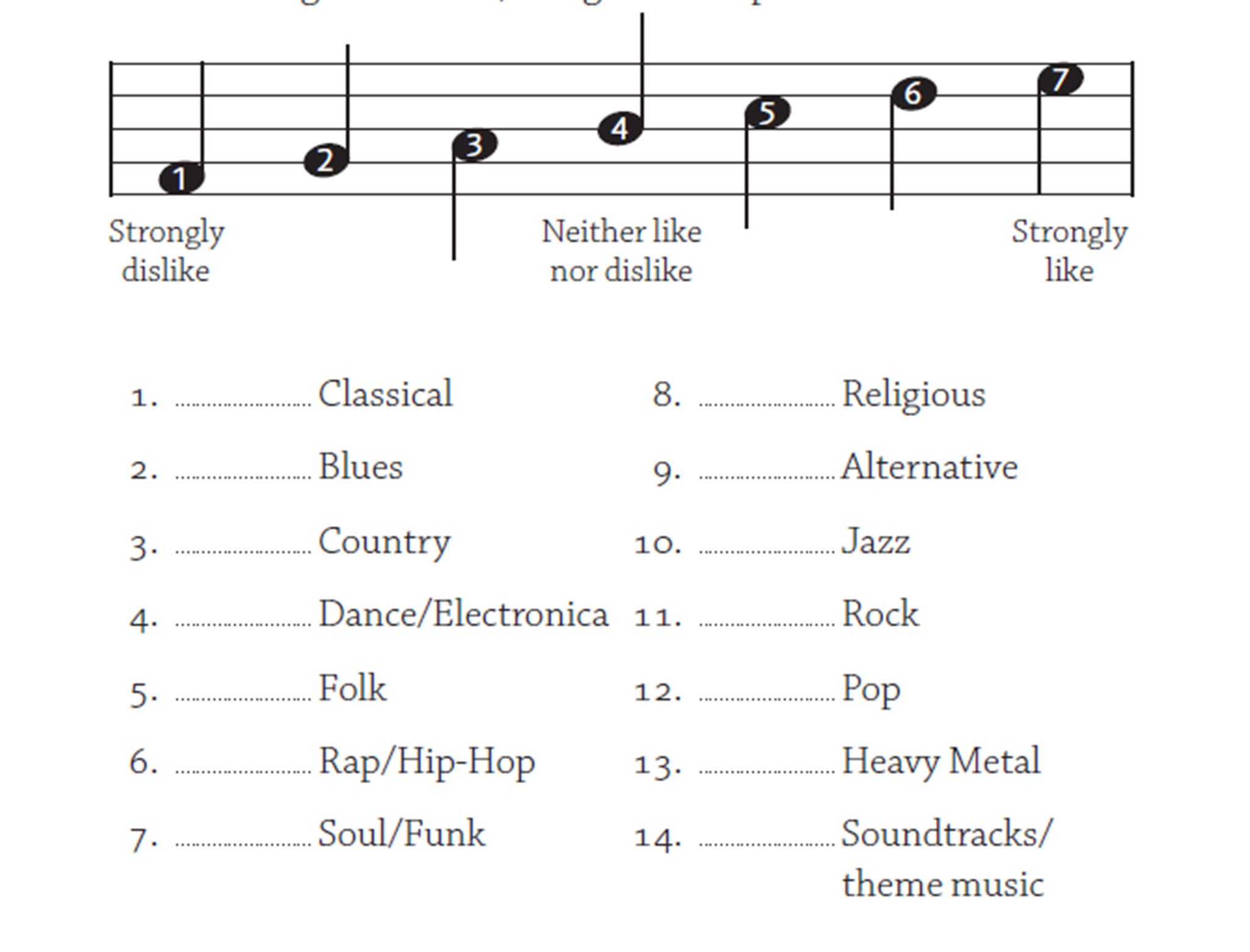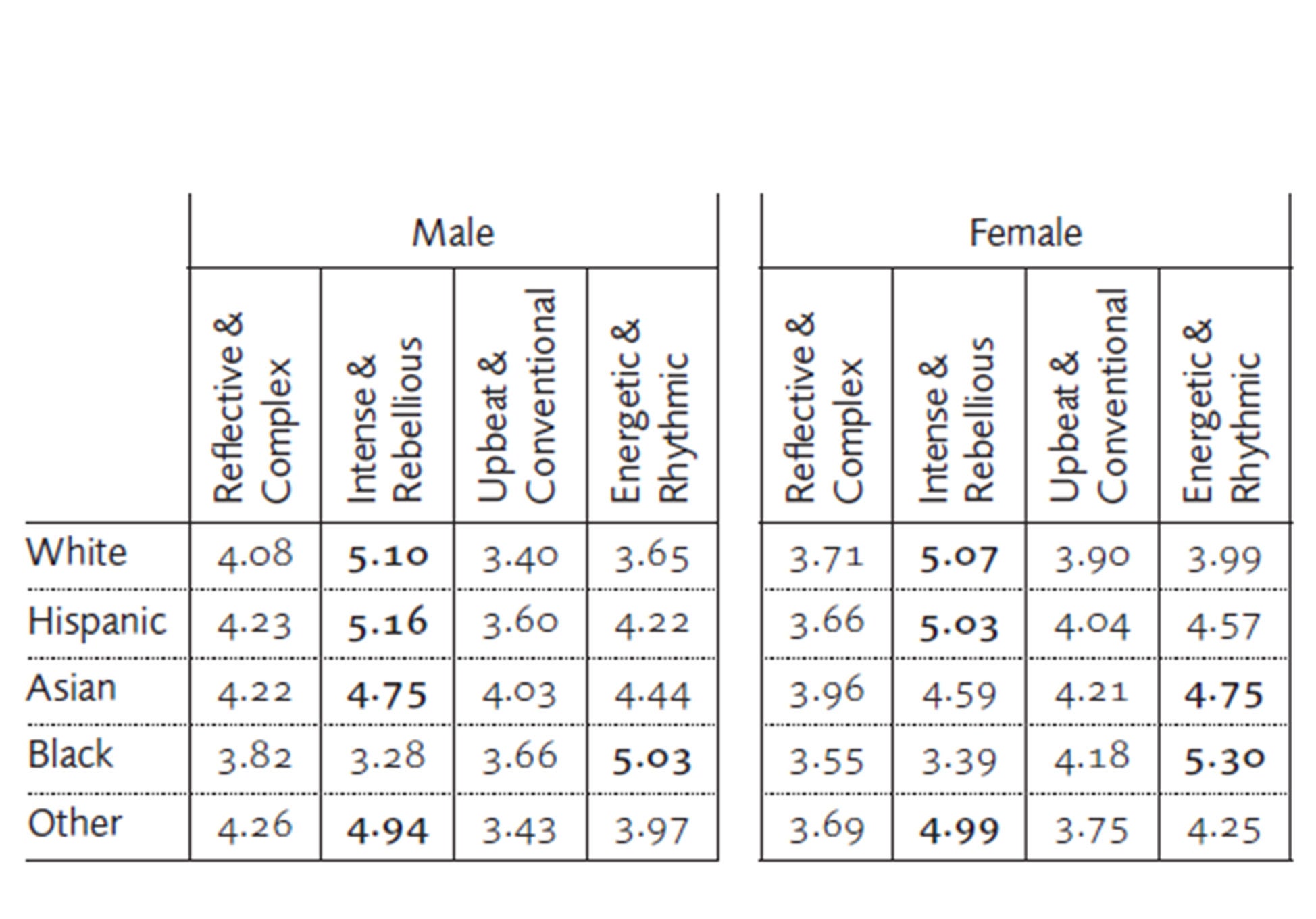The Independent's journalism is supported by our readers. When you purchase through links on our site, we may earn commission.
What does your taste in music say about your personality? Take the quiz
It is possible to discover a remarkable amount of information about a person simply by asking about his or her musical tastes

STOMP is the name of a musical percussion show that has enjoyed huge success worldwide. It is also the name of a questionnaire that is used to assess people’s tastes in music: the Short Test Of Musical Preferences.
A number of psychological studies have found that it is possible to discover a remarkable amount of information about a person simply by asking about his or her musical tastes. To find out what yours say about you, fi ll in the questionnaire below.
For the following items, please indicate your basic preference level for the genres listed, using the scale provided.

Studies conducted using the STOMP have found that people’s musical preferences tend to be rather systematic. For example, people who like blues music also tend to like jazz and classical, while those who enjoy soundtracks also like religious music and pop. What this means is that, although the test lists fourteen genres (and there are, of course, many more), we can collapse all of these into four ‘super genres’:
• To find out how much you like music that is Reflective and Complex, take the average of your scores for Blues, Classical, Folk and Jazz (i.e., add these scores together, then divide by 4).
• To find out how much you like music that is Intense and Rebellious, take the average of your scores for Alternative, Heavy Metal and Rock (i.e., add up, then divide by 3).
• To find out how much you like music that is Upbeat and Conventional, take the average of your scores for Country, Pop, Religious and Soundtracks (i.e., add up, then divide by 4).
• To find out how much you like music that is Energetic and Rhythmic, take the average of your scores for Electronic, Hip-Hop/Rap and Soul (i.e., add up, then divide by 3).
This is where the fun begins. The first thing we can do is find out how typical your tastes are of your gender and ethnicity (yes, I’m afraid the stereotype is true: white people like Rock and Metal, while black people prefer Hip-Hop and Soul). The table overleaf shows the average score for diff erent ethnic groups on each of the four super-genres (though note that this study was conducted in the United States, and the results many well be different for other countries). The style that is most preferred by members of each category is shown in bold. How do you compare?

More interestingly, we can use your musical preferences to make certain predictions about your personality, and even your intelligence. These predictions are based on studies in which researchers asked participants to complete the STOMP, as well as a personality test (and various other tests of their self-opinion and IQ), and looked for relationships between the scores.*
* A health warning: as is very often the case in psychology, we are talking about statistical generalisations, not hard and fast rules. For example, pretty much everyone accepts the statistical generalisation that ‘men are taller than women’ because, overall, it is true of men as a group and women as a group. At the same time, this does not mean that every man is taller than every woman, and it would not make sense to argue that the existence of some very short men and some very tall women disproves the generalisation. The statements below about – for example – ‘people who prefer Refl ective and Complex music’ should be understood in the same way: as generalisations about tendencies of that group as a whole, rather than as descriptions that apply to each and every individual member. It is also important to bear in mind that the studies in question were conducted in the United States, so these generalisations may not hold elsewhere (particularly in countries with very different musical traditions).
• People who prefer Reflective and Complex music (Blues, Classical, Folk and Jazz) score highly on openness to experience, and see themselves as unathletic, politically liberal and intelligent (and, indeed, perform well on objective IQ tests).
• People who prefer Intense and Rebellious music (Alternative, Heavy Metal and Rock) show almost exactly the same profile, except that they are more likely to see themselves as athletic.
• People who prefer Upbeat and Conventional music (Country, Pop, Religious and Soundtracks) are the polar opposite. They have low scores for openness to experience and intelligence (again, according to both self-report questionnaires and objective IQ tests) but tend to be agreeable, extroverted and conscientious, and see themselves as attractive, wealthy and athletic, as well as politically conservative. This group is the least prone to depression.
• People who prefer Energetic and Rhythmic music (Electronic, Rap/Hip-Hop and Soul) are also extroverted, agreeable, attractive and athletic. However, they do not share the political conservatism, wealth or lower intelligence scores of the Upbeat and Conventional group.
It is important to bear in mind that most of the relationships uncovered by the researchers (e.g., between a preference for Upbeat/Conventional music and lower IQ scores) were, although statistically significant, rather small. In The Fool Hath Said in His Heart . . ., we met the correlation coefficient, a number that expresses the size of a relationship between two measures, ranging from (no relationship) to 1 (perfect relationship).
On this scale, most of the relationships between measures (including between love of Upbeat/Conventional music and lower IQ) were around or smaller.
That said, a follow-up study by the same researchers found that most of the stereotypes that were expressed about certain groups in a questionnaire study (e.g., that fans of Classical, Rock and Religious music are intelligent, liberal and conservative respectively) did contain a kernel of truth. Another follow-up study by these authors found that, when students were given the task of getting to know each other in an online-dating-type set-up, they not only chose to discuss musical preferences more than any other topic but also used them to successfully predict many of their partner’s personality traits and personal values.
So the next time you meet a stranger and are curious to know her political views, you can get a very good idea simply by asking whether she prefers jazz or soundtracks.
This extract was published with permission from the author. Psy-Q by Ben Ambridge is available now
Join our commenting forum
Join thought-provoking conversations, follow other Independent readers and see their replies
Comments
Bookmark popover
Removed from bookmarks